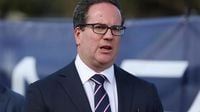In a year marked by both somber reflection and cautious hope, Australia’s veteran community is grappling with a mix of tragedy and progress as new figures reveal the nation’s lowest veteran suicide rate in over a decade. The Australian Institute of Health and Welfare (AIHW) released its annual report on September 9, 2025, showing that 73 current and former defence force members died by suicide in 2023—a figure not seen this low since 2013. While the decline offers a glimmer of improvement, the underlying reality remains stark: suicide continues to claim the lives of those who have served, at rates significantly higher than the general population.
Veterans’ Affairs Minister Matt Keogh confronted the findings with a mix of resolve and sorrow. Addressing reporters in Perth, he stated, “The statistics we’ve seen released today in the latest update do not paint a pretty picture.” He added, “One death is one too many. But we are encouraged to see that over the last few years, we have seen the number of personnel and veterans taking their own lives has started to fall.” According to the AIHW, the suicide rate among veterans has steadily declined since a high of 90 deaths in 2019, a trend that, while positive, is still overshadowed by the ongoing crisis.
The numbers tell a sobering story. Between 1997 and 2023, a total of 1,840 Australian Defence Force (ADF) members died by suicide—1,532 of them veterans, and 308 serving or reserve members. The suicide rate among male veterans stands at 26.4 deaths per 100,000 each year, while female veterans face a rate of 10 per 100,000. These figures are significantly higher than those found in the general Australian population. For men under 30, suicide accounts for 42% of deaths among those who previously served in the military, compared to 30% among their civilian peers. The situation is even more acute for women: those under 30 who have served have a suicide rate double that of all women in their age group.
As reported by The West Australian, Minister Keogh called the ongoing rate of suicide among ADF veterans “tragic,” emphasizing the devastating impact not just on the individuals lost, but on their families and the wider community. “It’s a tragedy for them. It’s a tragedy for the family members that they leave behind, and it’s why we’re so committed to making sure that we implement the recommendations from this Royal Commission,” he said. Paul Pham, head of AIHW’s defence and veterans unit, underscored the ripple effects of each loss: “It deeply affects families and loved ones and sends ripple effects throughout Australia’s defence and veteran community.”
The release of the AIHW report coincided with the first anniversary of the final report from the Royal Commission into Defence and Veteran Suicide, a sweeping inquiry that handed down 122 recommendations aimed at tackling the crisis. Yet, only nine of those recommendations have been fully implemented so far. Minister Keogh acknowledged the pace of progress, explaining, “We are working through the final timelines. My expectation at this stage is that the vast majority will be implemented by next year, but there will be some that will follow on a little after that. Some of the recommendations specifically say that work should happen in certain time frames, and some of them call for reviews to happen a few years after the implementation of recommendations.”
Among the reforms now in motion are the establishment of a Defence and Veterans’ Service Commission—expected to begin operations later in September 2025—and the creation of a dedicated agency for veteran wellbeing, targeted for launch by 2026. Other measures include a sexual misconduct inquiry and various regulatory and legislative changes. Minister Keogh stressed, “We take the royal commission incredibly seriously, and implementing its recommendations is something that the government is absolutely committed to. Our focus has been, and will continue to be, on improving both the experience of our people and the supports in place for them and their families during and after service.”
The urgency behind these reforms is underscored by the stark reality that suicide remains the leading cause of death for ex-service men and women under 30. According to the AIHW data, suicide accounted for 42% of deaths among male veterans under 30 between 2021 and 2023, and a staggering 44% among their female counterparts. In the same age group in the general population, suicide accounted for 30% of male deaths and 22% for females—figures that, while troubling, are still lower than those observed among veterans.
Despite the daunting statistics, there are some signs of progress. Paul Pham pointed out, “It is a good sign that the rate of suicide for ex-serving male and females hasn’t been increasing. The goal is always to try and observe these things going down (but) veterans suicide remains an issue of concern in the Australian community.”
Within the veteran community, reactions to the government’s response are a mix of support, frustration, and hope. Miquela Riley, vice president of RSLWA and a Navy veteran, described the statistics as “harrowing,” saying, “A lot of defense members that I’ve worked with have had issues with their mental health and potential attempts at suicide, which is horrifying.” Nonetheless, she expressed understanding for the measured pace of reform: “I think the government is doing enough. Would we like things to be faster, absolutely. But we’d also like the government to get it right, so we’re happy to take the time to get things right.”
David Thomas, a member of the RSLWA board and a former serviceman, noted that support for transitioning ADF members is “significantly better than in previous decades.” He added, “I’m not saying it’s perfect. I’m just saying that the transition is a lot more easier for those making that move out of military life today.”
As the Royal Commission prepares to deliver its final report and findings in June 2025, the path forward remains complex. The government faces the dual challenge of implementing reforms quickly enough to save lives, while also ensuring that changes are comprehensive and sustainable. Riley summed up the sentiment among many in the veteran community: “We do want the government to get this right the first time, but we will hold the government to account as and where it is needed to make sure we get the best outcomes for veterans and their families.”
For those in need of support, resources like Lifeline (13 11 14) and Open Arms (1800 011 046) remain vital. While the latest figures offer a measure of hope, every life lost is a reminder of the urgent work still ahead. The nation watches closely as promises of reform are put to the test, with the memories of those lost urging action, compassion, and unyielding vigilance.


